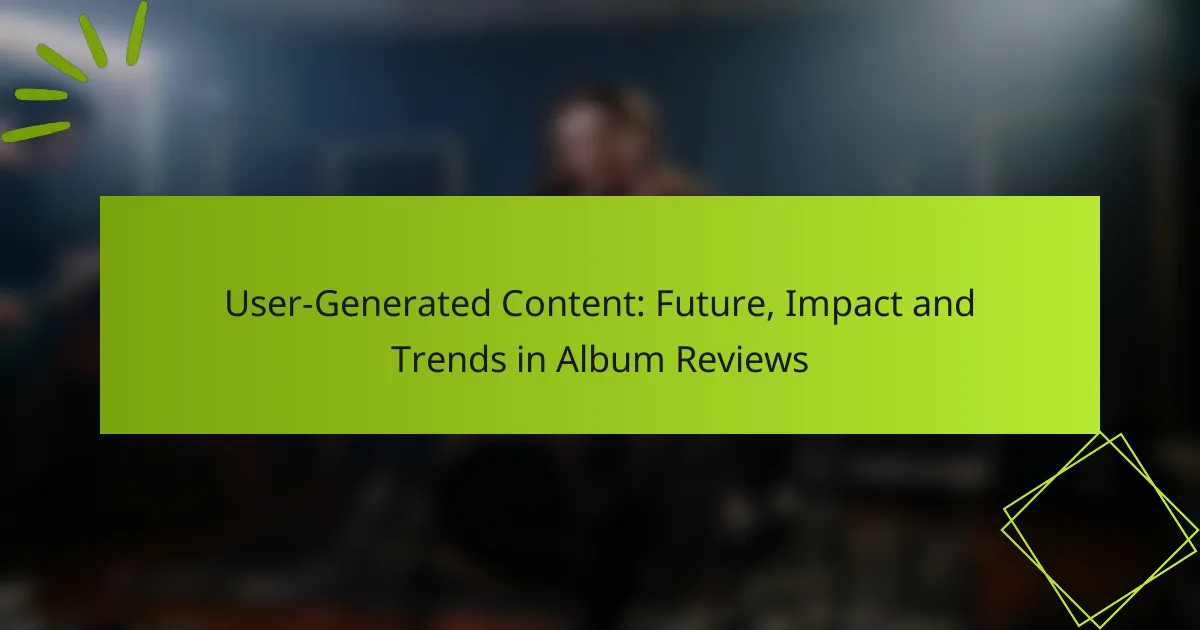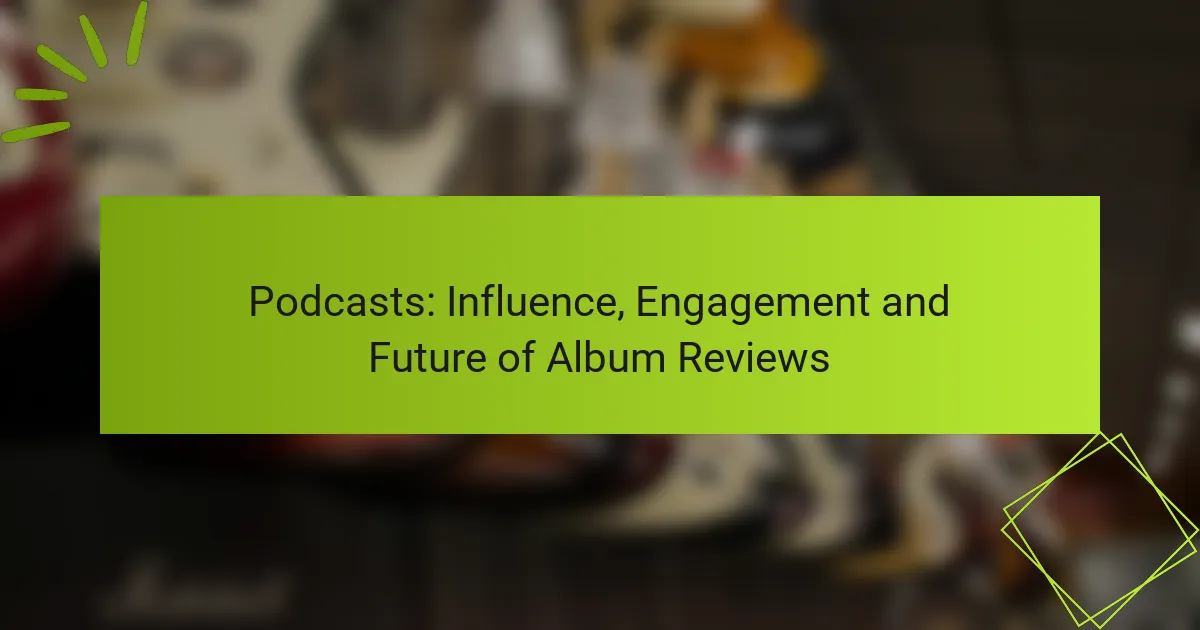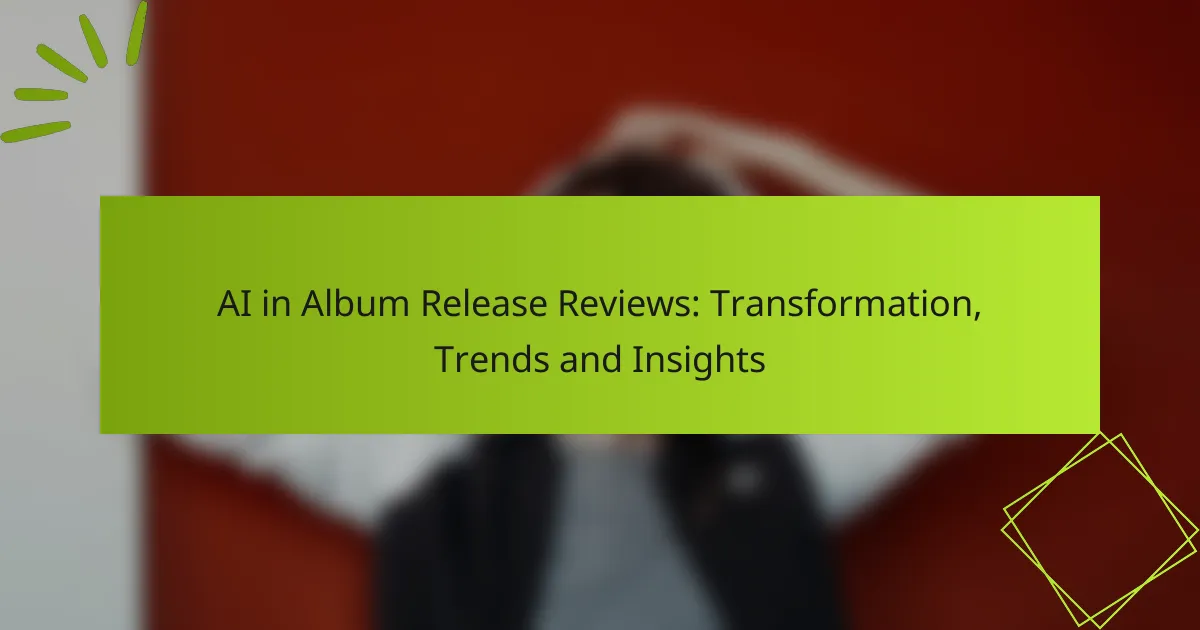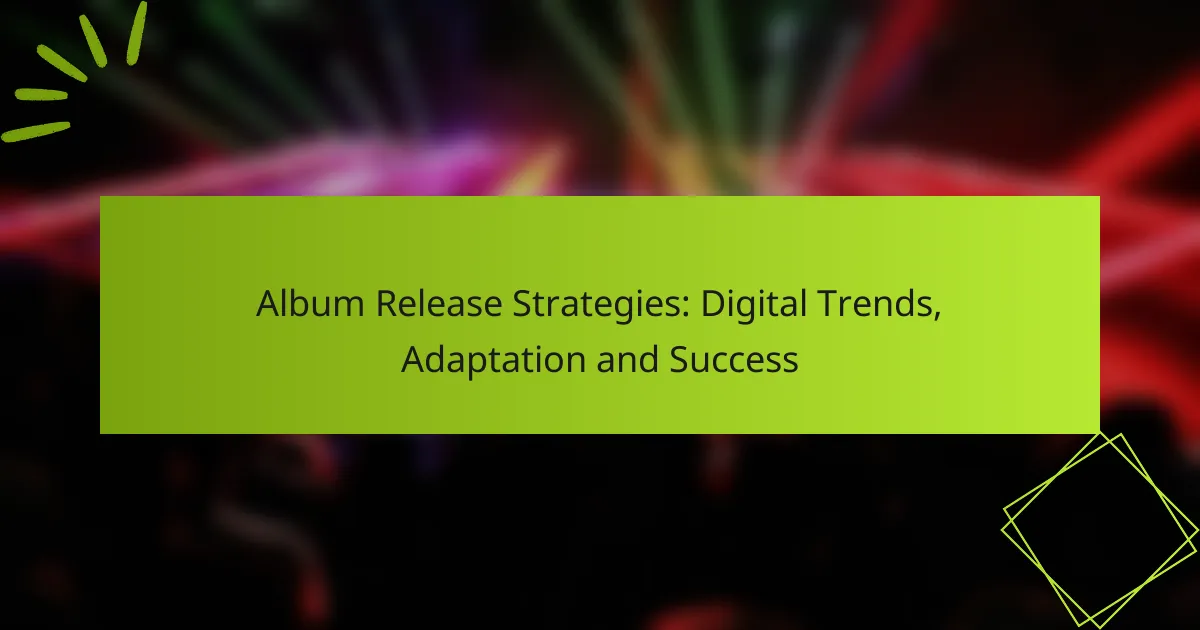User-generated content is revolutionizing the landscape of album reviews, making them more authentic and relatable. As fans share their thoughts and experiences, the diversity of opinions enriches music critique, while digital platforms and social media play a crucial role in shaping these reviews. This shift not only empowers listeners but also allows artists to engage with their audience, fostering community and enhancing their visibility.
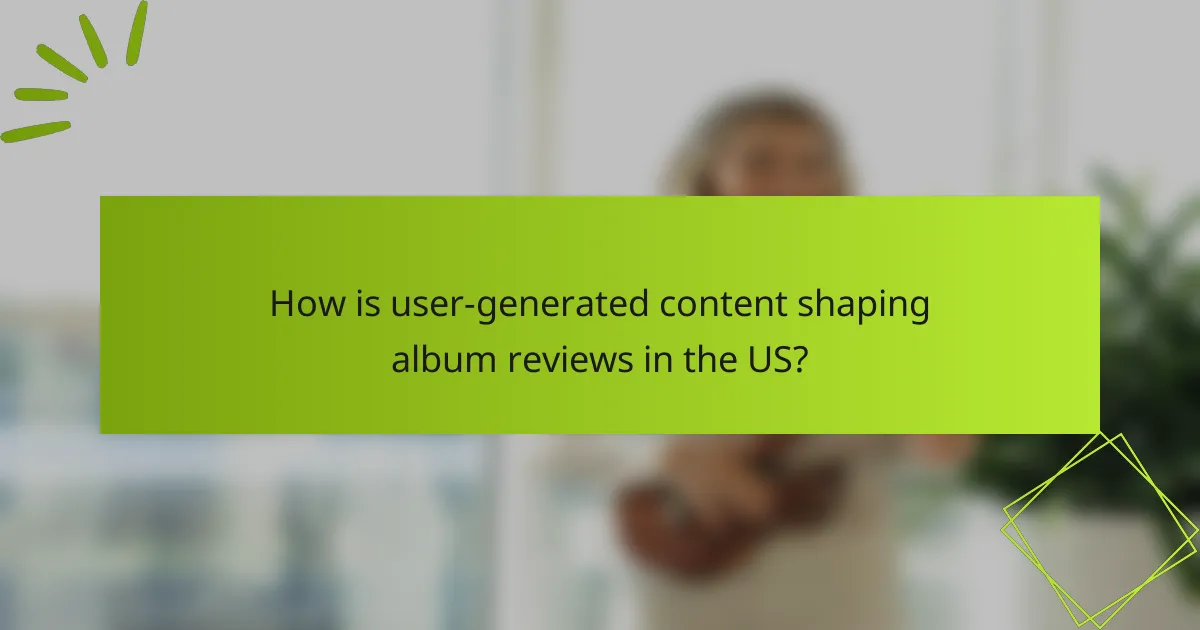
How is user-generated content shaping album reviews in the US?
User-generated content is significantly transforming album reviews in the US by fostering a more authentic and relatable music critique landscape. Fans and listeners are now able to share their thoughts and experiences, which enhances the overall credibility and diversity of opinions in music evaluation.
Increased authenticity and relatability
User-generated content brings a level of authenticity to album reviews that traditional media often lacks. Fans relate to each other’s personal stories and experiences with music, making reviews more engaging and trustworthy. This shift allows listeners to connect with the music on a deeper emotional level.
For example, a review that shares a listener’s memories tied to a specific album can resonate more than a professional critic’s analysis. This relatability encourages more listeners to share their own experiences, creating a vibrant community around music appreciation.
Enhanced engagement through social media
Social media platforms are pivotal in amplifying user-generated album reviews, allowing fans to share their opinions widely and interact with others. Platforms like Instagram, TikTok, and Twitter enable users to post quick reviews, snippets of songs, or even video reactions, fostering real-time discussions about new releases.
This engagement not only boosts visibility for albums but also cultivates a sense of community among fans. Artists often interact with their audience on these platforms, responding to reviews and creating a dialogue that enhances fan loyalty and interest.
Influence on music discovery
User-generated content plays a crucial role in how listeners discover new music. Reviews and recommendations from peers can be more influential than traditional advertising, as fans trust the opinions of fellow listeners. This organic discovery process often leads to a more diverse range of music being explored.
For instance, playlists curated by fans or viral trends on social media can introduce listeners to genres or artists they might not have encountered otherwise. This democratization of music discovery encourages a broader appreciation for various styles and sounds, enriching the overall music landscape.
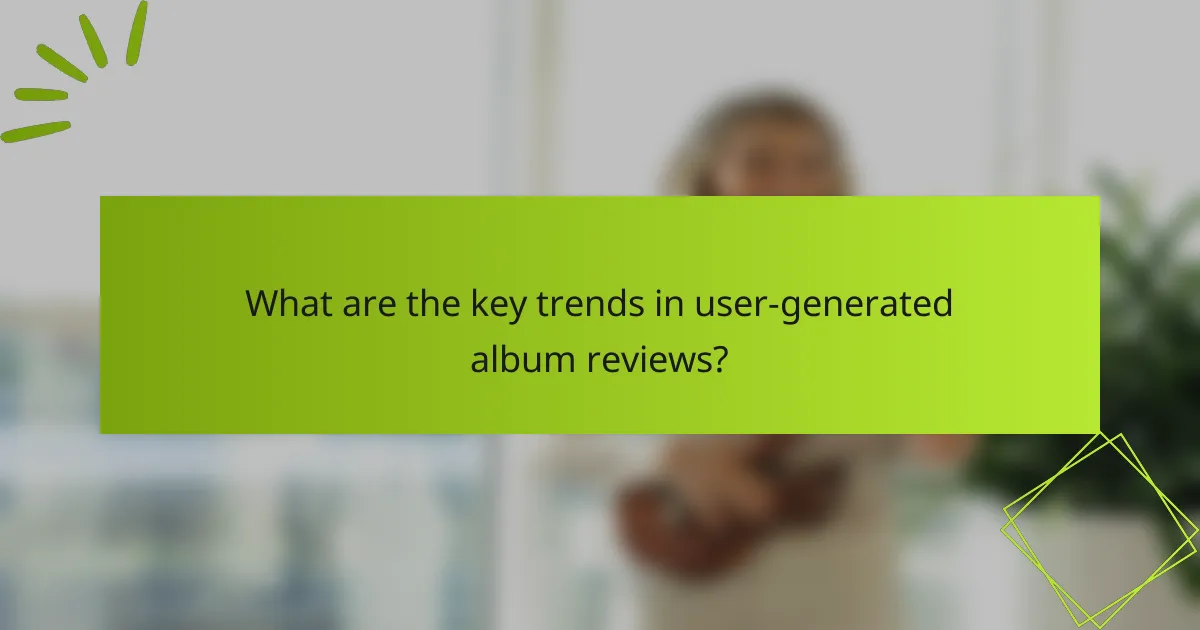
What are the key trends in user-generated album reviews?
User-generated album reviews are increasingly shaped by digital platforms and evolving consumer behavior. Key trends include the rise of video content, the integration of social media for music promotion, and a shift towards collaborative review platforms.
Rise of video reviews on platforms like YouTube
Video reviews on platforms such as YouTube have gained immense popularity, allowing users to express their opinions through engaging visual content. These reviews often include music clips, album artwork, and personal anecdotes, making them more relatable and entertaining.
Creators can build a loyal audience by consistently posting album reviews, which can lead to monetization opportunities through ads and sponsorships. This trend emphasizes the importance of authenticity and personality in content creation.
Integration of TikTok for music promotion
TikTok has transformed how music is promoted and reviewed, with short, catchy videos driving trends and album visibility. Users often create content that highlights specific songs or albums, which can lead to viral moments and increased streaming numbers.
Artists and labels are now leveraging TikTok to engage with fans directly, encouraging user-generated content that showcases their music. This platform’s algorithm favors engaging content, making it crucial for creators to capture attention quickly.
Shift towards collaborative review platforms
Collaborative review platforms are emerging as a way for music fans to collectively share their thoughts on albums. These platforms allow users to contribute reviews, ratings, and discussions, fostering a community-driven approach to music critique.
Such platforms often feature voting systems or consensus ratings, which can help highlight popular opinions and trends. This shift encourages diverse perspectives and enhances the overall quality of album reviews, as users can learn from each other’s insights.

How can artists leverage user-generated content?
Artists can leverage user-generated content (UGC) by actively engaging their fans to create and share reviews, feedback, and creative expressions related to their music. This not only fosters a sense of community but also enhances the visibility and credibility of the artist’s work.
Encouraging fan submissions on social media
To encourage fan submissions on social media, artists should create dedicated hashtags for their albums or songs. This allows fans to easily share their thoughts and experiences, making it simple for others to discover these contributions. Regularly featuring fan content on official pages can further motivate fans to participate.
Engagement can be enhanced by responding to fan posts and acknowledging their contributions. This two-way interaction builds loyalty and encourages more fans to share their reviews and experiences.
Utilizing platforms like Bandcamp for feedback
Platforms like Bandcamp provide artists with a direct line to their audience, allowing them to gather feedback through comments and reviews. Artists can encourage listeners to leave reviews after purchasing or streaming their music, creating a repository of user-generated content that can influence potential buyers.
Additionally, artists can analyze this feedback to understand listener preferences and improve future releases. Offering incentives, such as exclusive content or discounts, can further motivate fans to provide their insights.
Creating contests for best reviews
Hosting contests for the best reviews can stimulate fan engagement and generate valuable content. Artists can invite fans to submit their reviews, with the promise of prizes such as merchandise, concert tickets, or exclusive experiences for the most creative or insightful entries.
To maximize participation, artists should promote these contests across their social media channels and mailing lists. Clear guidelines and deadlines will help streamline submissions and ensure a fair judging process, ultimately enhancing community involvement and excitement around the artist’s work.
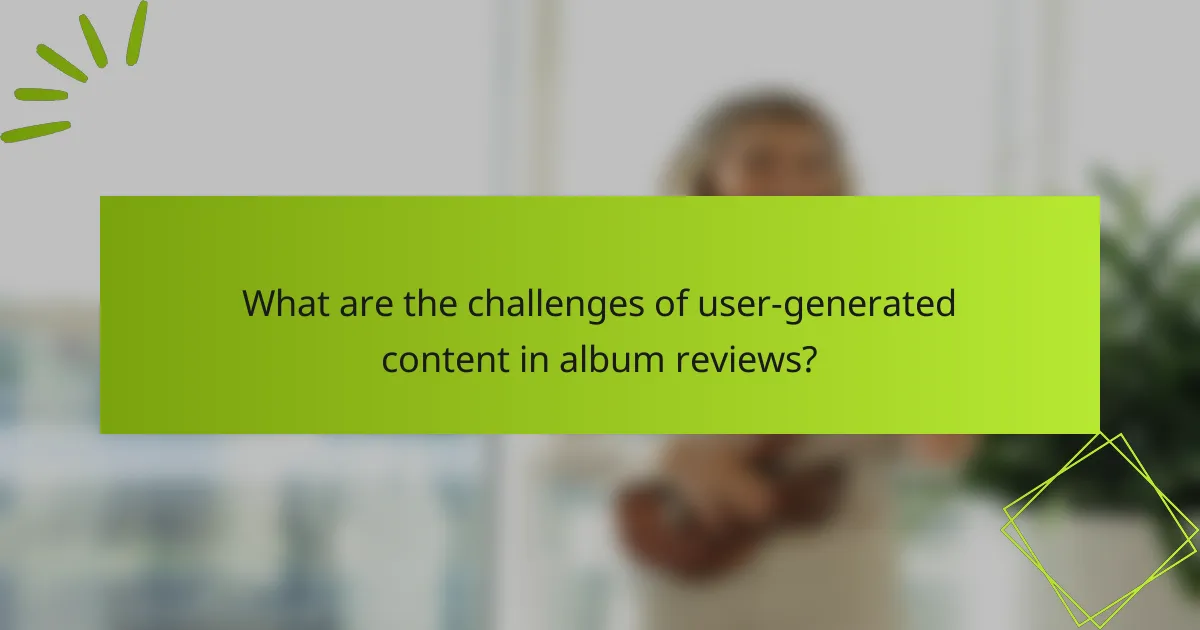
What are the challenges of user-generated content in album reviews?
User-generated content in album reviews faces several challenges, including misinformation, quality control, and copyright issues. These factors can significantly impact the reliability and credibility of reviews, making it essential for platforms to address them effectively.
Managing misinformation and bias
Misinformation and bias can distort the perception of an album, leading to skewed reviews. Users may unintentionally spread false information or allow personal biases to influence their opinions, which can mislead potential listeners.
To manage misinformation, platforms should implement verification processes for user contributions. Encouraging users to cite sources or provide context can help mitigate bias and enhance the credibility of reviews.
Ensuring quality control
Quality control is crucial for maintaining the integrity of user-generated album reviews. Without proper oversight, reviews can vary widely in depth and accuracy, making it difficult for readers to discern valuable insights.
Establishing guidelines for submissions can help improve quality. For instance, requiring a minimum word count or specific criteria for reviews can encourage more thoughtful contributions. Additionally, user ratings or upvoting systems can help highlight the most reliable reviews.
Navigating copyright issues
Copyright issues arise when users include copyrighted material in their reviews, such as song lyrics or album artwork. This can lead to legal complications for both the reviewer and the platform hosting the content.
To navigate these challenges, platforms should educate users about copyright laws and encourage them to use original content or properly attribute sources. Implementing a clear policy on acceptable content can help protect both users and the platform from potential legal disputes.

What frameworks can help evaluate user-generated content?
To effectively evaluate user-generated content, especially in album reviews, frameworks that assess credibility and engagement metrics are essential. These frameworks help identify reliable sources and measure the impact of reviews on audiences.
Criteria for assessing credibility
Credibility in user-generated content can be evaluated through several criteria, including author expertise, content quality, and the presence of supporting evidence. For instance, reviews from users with a history of insightful commentary or those who provide detailed analysis tend to be more trustworthy.
Additionally, consider the context of the review. Reviews that engage with specific elements of the album, such as lyrics or production quality, often indicate a deeper understanding. Look for patterns in user feedback; consistent praise or criticism across multiple reviews can signal reliability.
Metrics for engagement and reach
Engagement metrics such as likes, shares, and comments are crucial for understanding the reach of user-generated album reviews. High engagement levels often indicate that the content resonates with the audience, making it more influential in shaping opinions.
Another important metric is the review’s visibility on platforms. For example, reviews that appear prominently on music streaming services or social media tend to attract more attention. Tracking these metrics over time can help identify trends and shifts in audience preferences, guiding future content strategies.

What future trends can we expect in user-generated album reviews?
Future trends in user-generated album reviews will likely focus on increased personalization, enhanced interactivity, and the integration of advanced technologies. As platforms evolve, users will have more tools to express their opinions and connect with others, shaping the way music is critiqued and consumed.
Increased Personalization
As algorithms become more sophisticated, user-generated album reviews will increasingly reflect individual preferences. Platforms may use data analytics to tailor recommendations and highlight reviews that resonate with a user’s unique taste. This could lead to a more engaging experience, where listeners discover music that aligns closely with their interests.
For example, a user who frequently reviews indie rock might see more content from that genre, while receiving notifications about new releases that match their style. This personalized approach can enhance user satisfaction and foster a deeper connection with the music.
Enhanced Interactivity
Future album review platforms are expected to incorporate more interactive features, allowing users to engage in discussions and share insights in real-time. This could include live comment sections during album launches or the ability to create collaborative playlists based on collective reviews.
Such interactivity not only enriches the review process but also builds a community around shared musical experiences. Users can vote on the most helpful reviews or participate in polls, making the feedback loop more dynamic and participatory.
Integration of Advanced Technologies
Emerging technologies like artificial intelligence and augmented reality are set to transform how users create and consume album reviews. AI can assist in generating summaries or highlighting key themes in reviews, while augmented reality may allow users to visualize album art or artist backgrounds in immersive ways.
These technological advancements can streamline the review process and make it more engaging. For instance, a user might scan an album cover with their phone to access a 3D experience that includes reviews, artist interviews, and behind-the-scenes content, enhancing their overall understanding and appreciation of the music.
